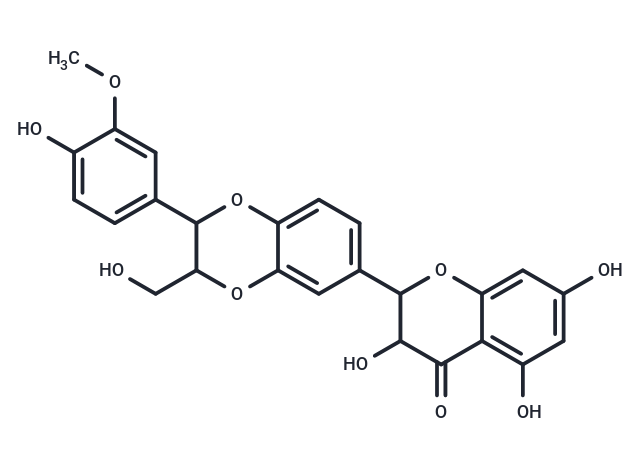Shopping Cart
- Remove All
 Your shopping cart is currently empty
Your shopping cart is currently empty

Silymarin (Silybin B) (Silybin B) is a polyphenolic flavonoid that extracts from the milk thistle or seeds of Silybum marianum. It is used in the prevention and treatment of liver diseases.

| Pack Size | Price | Availability | Quantity |
|---|---|---|---|
| 250 mg | $42 | In Stock | |
| 500 mg | $62 | In Stock | |
| 1 mL x 10 mM (in DMSO) | $50 | In Stock |
| Description | Silymarin (Silybin B) (Silybin B) is a polyphenolic flavonoid that extracts from the milk thistle or seeds of Silybum marianum. It is used in the prevention and treatment of liver diseases. |
| In vitro | Mechanism of Silymarin involves different biochemical reactions, such as stimulation of the rate of ribosomal RNA synthesis by stimulating the transcription of polymerase I and ribosomal RNA genes, blockage of alpha-glycoside loops toxin intake, and protection of cell membranes from free radical-induced damage. Silymarin also displays a substantial protective effect against UVB-induced canceration at different stages, possibly through its strong antioxidant properties. |
| In vivo | The intravenous injection LD50 of Silymarin is 391.4 mg/kg, 70.1 mg/kg, 142.3 mg/kg for mice, rats, rabbits, respectively. |
| Alias | Silybin B |
| Molecular Weight | 482.44 |
| Formula | C25H22O10 |
| Cas No. | 65666-07-1 |
| Smiles | COc1cc(ccc1O)C1Oc2ccc(cc2OC1CO)C1Oc2cc(O)cc(O)c2C(=O)C1O |
| Relative Density. | 1.527 g/cm3 |
| Storage | Powder: -20°C for 3 years | In solvent: -80°C for 1 year | Shipping with blue ice. | |||||||||||||||||||||||||||||||||||
| Solubility Information | DMSO: 45 mg/mL (93.28 mM), Sonication is recommended. H2O: < 1 mg/mL (insoluble or slightly soluble) Ethanol: 1 mg/mL (2.07 mM), Sonication is recommended. | |||||||||||||||||||||||||||||||||||
Solution Preparation Table | ||||||||||||||||||||||||||||||||||||
Ethanol/DMSO
DMSO
| ||||||||||||||||||||||||||||||||||||

Copyright © 2015-2025 TargetMol Chemicals Inc. All Rights Reserved.